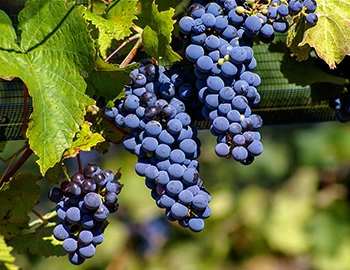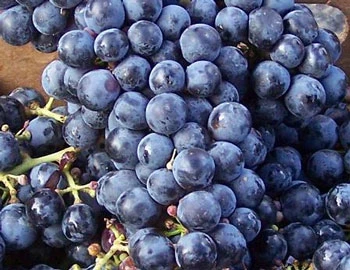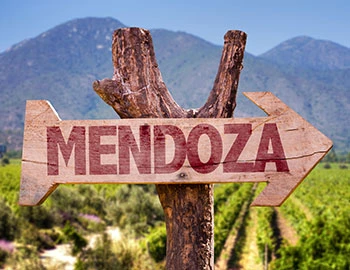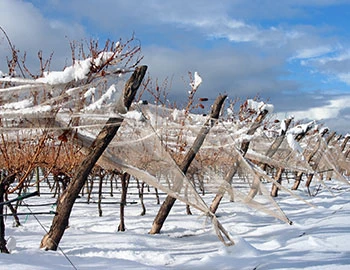Benmarco Expresivo 2021
Mendoza, Susana Balbo Wines, 750 ml

| Grape variety: | Malbec, Cabernet Franc |
| Producer: | Susana Balbo Wines |
| Origin: | Argentina / Mendoza |
Description
Susana Balbo, Argentina's pioneering oenologist, has created a cuvée a cuvée that feels like a loving embrace. Malbec and Cabernet Franc from the high altitudes of Mendoza present themselves with fullness and structure in harmonious unison and provide joyful moments for the palate both at dinner and afterwards. The nose and palate are enveloped in warming fruit and spice. Amarena cherries and liquorice set the pace, accompanied by coffee and dark chocolate. Generous and full-bodied at the same time.
Attributes
| Origin: | Argentina / Mendoza |
| Grape variety: | Malbec, Cabernet Franc |
| Label: | Vegan |
| Ripening potential: | 2 to 10 years |
| Drinking temperature: | 16 to 18 °C |
| Food Pairing: | Châteaubriand, Filet Wellington, Spicy hard cheese, Roast saddle of venison, Latin American dishes, Spiced grillades |
| Vinification: | fully destemmed, long must fermentation, Pumping over |
| Harvest: | hand-picking |
| Maturation: | in new barriques |
| Bottling: | filtration |
| Maturation duration: | 14 months |
| Volume: | 14.5 % |
| Note: | Contains sulphites |
Susana Balbo Wines
The mighty Aconcagua watches over the plain of Mendoza, 1000 kilometres from Argentina’s capital Buenos Aires. A barren, semi-arid land where Jesuits and Franciscans, after the Spanish conquest in the 16th century, discovered favourable natural conditions for viticulture.
At 1000 to 3000 meters above sea level lies this oldest and most important wine region of the country. The village of Agrelo, near Luján de Cuyo, is home to the bodega founded by Susana Balbo in 1999. She is a woman with an impressive career. In 1981, she became the first woman in Argentina to successfully complete her degree in œnology. In 2015, Drinks Business magazine named her “Woman of the Year”. In 2018, she was recognised as one of the ten most influential women in the international wine trade. She also presided over the national marketing organisation Wines of Argentina for several years.

Malbec
New Home, New Fortune
The Malbec once belonged to the classic assortment of varieties from Bordeaux. But it was demanding to cultivate, and in the changeable climate of the Bordelais it often became green and herbaceous, so winemakers replaced it with Merlot in the middle of the 20th century. Luckily, the Malbec found a new home in Argentina. In 1868, a Frenchman brought the first stocks along to the land of the Andes. Today, the Malbec is the most-planted variety there. Especially in Mendoza, it shows what it can do: it yields very dark, well-structured wines with aromas of black fruit, violets and game. They just call out for an Argentinean steak! The Malbec has its origins in Cahors, in southwestern France. There, it is kept today under the name Cot. Due to their earthy tannins, in the middle ages the growths from this area were also called "the black wines of Cahors".

Cabernet Franc
Forefather of the Bordeaux varieties
The Cabernet Franc is one of the oldest varieties of Bordelais and a parent of three other red grapes in the Bordeaux assortment: Cabernet Sauvignon, Merlot and Carmenère. It is distinguished by its complex, flavourful bouquet of raspberry, graphite, violet, liquorice and white pepper. In addition, it presents round, crisp tannins which turn out less strongly than those of Cabernet Sauvignon. While the Cabernet Franc always appears as part of a blend in Bordeaux, it is pressed alone on the Loire. The most renowned appellations are Chinon and Bourgueil. Incidentally, the Cabernet originates not in Bordeaux but in the Spanish Basque Country. Cabernet owes its name to the Latin “carbon”, meaning black.

Mendoza
Mendoza: Malbec and more
Whenever someone talks about Argentinian wine, they generally mean wines from Mendoza. Roughly 60 percent of all Argentine wines are produced around the metropolis of the same name. In particular, Malbec, a red wine variety originating from southwestern France, has found a new home here, providing focused, well-structured wines. Cabernet Sauvignon and Chardonnay also thrive. The best wines result from high elevations, in the foothills of the Andes

Argentina
Where nostalgia tangoes with innovation
Snow-covered Andean peaks and salt lakes, deserts, rugged mountain villages, elegant colonial cities, vibrant metropolises, red canyons and green valleys – Argentinian has them all. And, of course, excellent wine. Argentina is named after the Latin word for silver, “Argentum,” because of the treasures expected to be found there. Among others, homesick colonialists and Catholic priests had a hand in cultivating these liquid treasures, and today there are approximately 220,000 hectares of vineyards.



